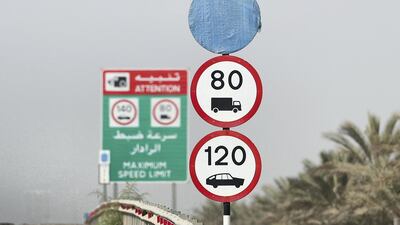Much of the chatter around the office water cooler and at my favourite Abu Dhabi coffee shop this week was dominated by the abolition of the buffer zone that allowed drivers to travel 20 kilometres per hour faster than the posted speed limit on the capital’s roads.
At work, my colleagues fully supported the move, particularly the new arrivals who have never really understood the buffer zone concept to start with. “That’s not a buffer zone,” one exclaimed. “That’s a huge chasm.”
However, in my go-to shisha cafe in the heart of Khalidiyah, the ruling – while supported for its safety benefits – was greeted with solemnity.
While the usual crew at Anoud Cafe – who are mostly Egyptian, Sudanese and Lebanese – saluted the decision to curb the need for speed, their lament about the new traffic changes is attributed to something far deeper than the speed limits.
“Khalas, the days of mercy are over,” mused Magdi. “I am still getting used to it. I don’t know where to look at times: the road or the speedometer.”
I tended to agree with him, as I too found myself with this problem to and from work since it kicked in on Sunday, and I must admit, I did fall foul of the limit a few times. “Be careful, bro,” was Magdi’s reply to this admission. “That’s it, you will get fined, there is no more majaal.”
Magdi’s comment went some way to explaining the dour manner in which some of us received the news of the new rules. It was indeed more to do with the increasing loss of “majaal” in our daily life.
What is majaal? The Arabic term can be loosely defined as a range of space, encompassing both the physical to the emotional.
As I chatted with the group, they made me realise how majaal has always played a subtle yet important role in my Abu Dhabi experience. Having the freedom to pay my bills at Anoud, the local grocery store, and the launderette by way of a weekly tab is a form of capital majaal.
The express lanes I often use at the Yas Island amusement parks is majaal in action. Giving the benefit of the doubt is what majaal is about.
The discussions I have with my Arabic friends are often underpinned by a refreshing sense of calm and forgiveness. As life gets busier, the chances of frustrating those close to us gets easier. In our group, though, that is rarely the case. Forgiveness for real and perceived slights is easily given.
In short, majaal is sort of life’s buffer zone. It is the principle of allowing space – whether it’s between yourself and others, or yourself and any given situation – to give you better perspective and decision-making capabilities.
Thinking even more deeply on the issue, it’s a philosophy that can be found in Islamic spiritual literature, with plentiful verses from the Quran encouraging us to reflect before taking action.
The UAE is the most majaal-friendly country I know. Compared to those in Australia, the UAE authorities are positively generous when it comes to providing us time and space to get our act together. Back in Melbourne though, uh uh. I once paid a parking fine a day late and as a result, the amount increased by as much as 30 per cent.
In Abu Dhabi, you can pay outstanding traffic fines months later. There is greater sense of flexibility here when it comes to resolving issues. From the municipality employee to the Mawaqif officer, often it just takes a smile and an open mind to come up with a solution that is satisfying to all. However, as the UAE undertakes measures to diversify its economy, one of the unintended consequences is the limiting of that majaal space.
My grocery store and launderette have ditched their tab systems, while Anoud Cafe has put a two-day limit on my tab. That’s OK, I am not too worried. Like most things here in Abu Dhabi, I know that most challenges can be solved by way of a good old-fashioned chat.
_____________________
Read more from Saeed:
Domestic workers who take care of our families and homes are 'silent heroes'
Part-time work in the UAE: What working at a video store when I was 15 taught me about life
The WhatsApp council of candid friends that keeps me grounded
Chinese soaps on TV dubbed into Arabic? Bring it on
With the World Cup about to end, the UAE summer is really about to beg
_____________________


